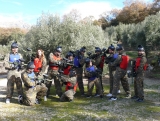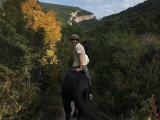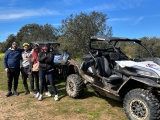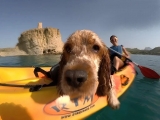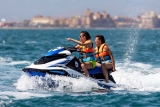Eunate Aguirre is a true expert in aquatic environments, as among all the adventure sports you can find, she specialises in surfing. Without a doubt, she is a true expert on the board who has carved out a space for herself in this sport, which is predominantly practised by men.

Yumping.- You started catching waves at 11 and were competing by 13... What’s it like growing up by the sea?
Eunate Aguirre.- It wasn’t a childhood very different from other kids my age, but with the added element of passion—in my case, catching waves. I’ve loved the sea since I was very young, but otherwise, my childhood was the same; I don’t think it differed much from others.
Y.- But you entered competitions, which meant adhering to a stricter schedule.
E.A.- The world of competitions made me miss a lot of school, and my parents were always reminding me that I had to pass everything. In that sense, my childhood was different—while my friends were meeting up on weekends to go to Bilbao’s old town, I was off to Asturias and other places chasing waves and having experiences that felt far more exciting to me.
Y.- Soon after, you started winning titles—your first was as double European Junior Champion...
E.A.- My first experience was in local championships, and I didn’t do too well. Later, I focused on observing before even hitting the waves, and that’s when I started taking it more seriously, concentrating harder, which led to better results.

Y.- That’s when brands like Quiksilver took an interest in you. What’s that like for a teenager?
E.A.- My first thought was the thrill of having sponsorship—first from Genesis boards, which pushed me to dedicate myself even more intensely. When a brand takes notice of you and starts offering support, it makes you think, "If they’re backing me now, they could take me even further in the future." I saw a future; I realised I could make this my career.
Back then, I signed with Quiksilver, which, despite being a male-dominated brand, helped me immensely—Roxy didn’t carry as much weight then as it does now. I felt lucky and wanted their support to achieve my goals.
Y.- Were the early days tough?
E.A.- The start of high-level competition was hard—the travel, the loneliness, especially being so young, adjusting to foreign food, not sleeping at home... But I saw that the effort paid off, as my skills grew even without excessive training hours.
Y.- Do you think female surfers have it harder than men? Traditionally, it’s a male-dominated sport...

Now, I’d love for things to be different. I’ve found my path—competing against women, which feels much more comfortable. Back then, I surfed with them and paved my way. Now, I meet fellow female surfers, maybe not at my level, but it’s great to share the waves and enjoy my element.
Y.- Your physical trainer is male. Would you prefer a female coach?
E.A.- I’m very comfortable with him—we spend a lot of time together—but sometimes I miss female camaraderie: travelling, sharing hotel rooms... Though who knows, maybe I wouldn’t get along with a female coach either!

Y.- More and more girls are taking up surfing. Do you think Spain has a strong scene?
E.A.- I think while men’s surfing has boomed, women’s is still catching up. Globally, in disciplines like kitesurfing or windsurfing, there are top athletes, but I believe the next generations will see more girls in terms of numbers.
Y.- It’s rare for young girls to commit to a sport like surfing...
E.A.- This sport needs the Cantabrian Sea, Cádiz, or Barcelona—four days a year! And since girls are often less inclined to take up sports... it’s tricky. But more schools are offering lessons, and more girls are getting into it.

Y.- A month ago, Roxy hosted an event in Ibiza to promote Paddle Surf. You joined the world’s top windsurfers, kitesurfers, and bodyboarders. How was it?
E.A.- It was incredible. For me, it was my second year, and the move from Madrid to Ibiza was a great change. The images online speak for themselves—the girls are amazing in their disciplines, absolute beasts. Plus, Ibiza’s beaches are stunning. I’m thrilled I went and can’t wait for the next event.
Y.- How do you see Paddle Surf today?
E.A.- It’s a practice that connects people with nature. It’s a slow, beginner-friendly way to start—you can paddle, enjoy nature, without catching waves right away. No extreme fitness is needed; it’s accessible to almost everyone.

Y.- Are there special requirements to surf?
E.A.- Surfing demands immense patience—it’s a sport where conditions constantly change. You must anticipate what’s coming, have board skills... but it’s incredibly rewarding.
Y.- The IBA just announced the cancellation of the 2010 tour’s second event. What does this mean?
E.A.- Yes, we had an event in Aruba, and I planned to train there. It’s their first time organising, so there might have been a last-minute issue with requirements. Maybe the crisis affected it... But on the bright side, it gives me more time to train at home.

Y.- You’re third overall after Brazil’s Buizos event. How was it?
E.A.- Last year was tough—I fought for first place, wanting to be world champion, but the pressure got to me. I came second, and this year, I want to surf without pressure, train hard, and stay relaxed. In Brazil, I tested my fitness, started the season strong, and felt great—averaged 14, with solid heats. I missed the final, but it’s positive overall, and the title is still within reach.
Y.- What’s your next goal?
E.A.- Clearly, my goal is to be world champion, and I’ll fight for it. I came close last year (second place), but I see this as a long-term project—not just about winning but working hard. I’ll compete in Portugal late August, then Canarias—two Grand Slam events to rack up points.

Y.- Beyond typical surf spots like Hawaii, California, or Australia, Spain has great waves too. But the Canary Islands are exceptional...
E.A.- The Canaries have incredible waters—I think they’re the third-best globally. For me, surfing there in winter is a privilege...





